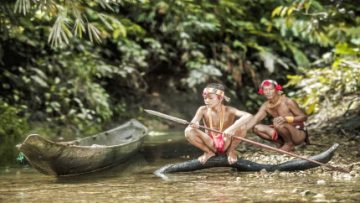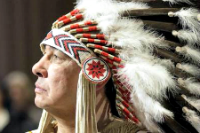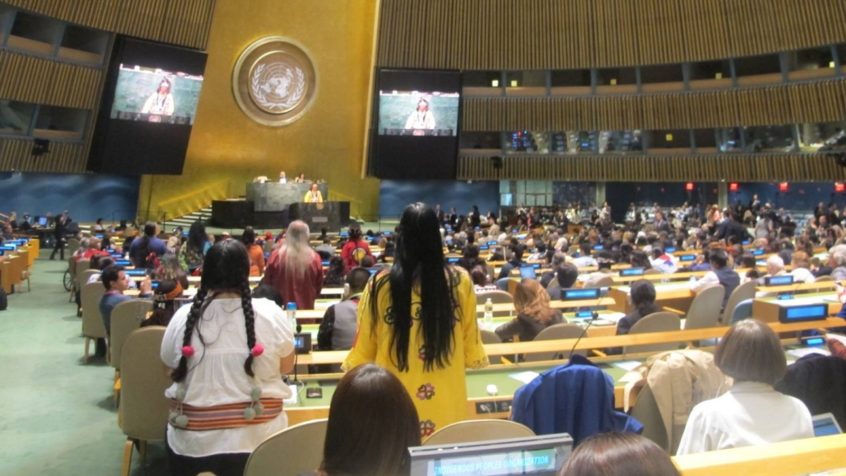Registration is now open!
Session 1: Monday 18 January (US) / Tuesday 19 January (Asia) – click here to register
Session 2: Tuesday 19 January (US) / Wednesday 20 January (Asia) – click here to register
Background
In 2020, the Permanent Forum on Indigenous Issues postponed its 19th session due to the COVID-19 pandemic. The Economic and Social Council decided that the 20th session of the Permanent Forum will take place from 19-30 April 2021 on the theme of “Peace, justice and effective institutions: the role of indigenous peoples in the fulfilment of Sustainable Development Goal 16″.
Introduction
In preparation for the 2021 session, the Permanent Forum will conduct informal virtual dialogues with indigenous peoples and Member State representatives. United Nations agencies, funds and programmes, regional and national human rights institutions, NGOs in consultative status with ECOSOC, and academia are also invited to participate. These virtual dialogues were instituted by Forum Members to continue the tradition of regional consultations that take place during the annual sessions of the Forum. The aim of the regional dialogues initiated in 2018, is to discuss issues of relevance in the countries of the region and identify how to sharpen the focus and impact of the Permanent Forum’s analysis and recommendations.
Mr. Phoolman Chaudhary, member of the Permanent Forum from Asia will co-lead the dialogue with Ms. Zhang Xiaoan, a fellow PFII member.
Mr. Chaudhary is the Executive President of Asian Indigenous International Network (AIIN) and is affiliated with a number of organizations advocating for indigenous peoples’ rights. He was also an Indigenous Fellow with the Office of the United Nations High Commissioner for Human Rights (OHCHR) in Geneva, Switzerland and has been a member of the Permanent Forum since 2017.
Ms. Zhang Xiaoan has been in the Chinese Foreign Service for 29 years and has extensive experience in multilateral diplomacy, especially in United Nations affairs. She was posted to the Chinese Permanent Mission to the United Nations in New York from 1991-1995 and 1999-2003, and also served as the Deputy Head and Counselor of the Chinese Embassy in Israel for 5 years. Ms. Xiaoan has been affiliated with the United Nations Association of China since May 2010 and is currently a member of the Executive Board. She has been a member of the Permanent Forum since 2017.
Objectives
Provide a mechanism for a regional dialogue between indigenous peoples, Member States, and the United Nations system with the members of the Permanent Forum
- Identify key challenges and gaps in policy and practice in Asia as input to the April 2021 annual session of the Permanent Forum;
- Identify specific strategic measures to promote the implementation of the United Nations Declaration on the Rights of Indigenous Peoples;
- Strategize on how to ensure greater incorporation of the rights of indigenous peoples in the work of the UN, especially at country level; and
- Provide input and insight to the Permanent Forum on advancing the rights of indigenous peoples in the 2030 Agenda, with particular reference to Sustainable Development Goal 16.
Sessions and Themes
The following four topics will be discussed over two days/four sessions.
Tuesday 19 January 2021 – 9-11 AM (Bangkok) / Monday 18 January 9-11 PM US (EST)
Effects of COVID-19 on Indigenous Peoples in Asia
- Discussant: Meenakshi Munda, Asia Pacific Indigenous Youth Network/Jharkhand Indigenous and Tribal Peoples for Action
Rights to lands, territories and resources
- Discussant: Jannie Lasimbang, MP, Sabah and former member of EMRIP and SUHAKAM
Wednesday 20 January 2021 9-11 AM (Bangkok) / Tuesday 19 January 9-11 PM US (EST)
Conflict resolution and peacebuilding (SDG 16)
- Discussant: Mangal Kumar Chakman Parbatya Chattagram Jana Samhati Samiti, PCJSS
Working with the UN system at national level under the reformed UN development system – opportunities for indigenous peoples
- Discussant: Neil Buhne, Regional Director, United Nations Development Coordination Office, Asia-Pacific
Guiding Questions
- What During the COVID pandemic, what have been the key problems for indigenous peoples in the Asia region?
- Conflict prevention and peace –What are the main challenges in securing peace and security for indigenous peoples?
- How are indigenous peoples influencing peace process and peace accords? How can we overcome the challenges of implementing indigenous justice systems and legal pluralism?
- What are the opportunities with the new UN Resident Coordinator system and the new UN Sustainable Development Cooperation Frameworks?
- Are indigenous peoples consulted by UN country teams and how can this be enhanced or established, if no mechanism exits?
- Do you have any specific recommendations on any of these issues to the PFII, the United Nations system, Member States, the private sector, indigenous peoples’ organizations or other stakeholders?
The Permanent Forum
The United Nations Permanent Forum on Indigenous Issues (UNPFII) is a high- level advisory body to the Economic and Social Council. The Forum was established on 28 July 2000 by resolution 2000/22, with the mandate to deal with indigenous issues related to economic and social development, culture, the environment, education, health and human rights.
More specifically, the Permanent Forum:
Provides expert advice and recommendations on indigenous issues to the Council, as well as to programmes, funds and agencies of the United Nations, through ECOSOC;
- Raises awareness and promotes the integration and coordination of activities related to indigenous issues within the UN system;
- Prepares and disseminates information on indigenous issues;
- Promotes respect for and full application of the provisions of the UN Declaration on the Rights of Indigenous Peoples and follows up on the effectiveness of this Declaration (Art. 42 UNDRIP).
In addition to the six mandated areas (economic and social development, culture, the environment, education, health and human rights), each session is thematically focused on a specific issue. The Permanent Forum is one of three UN bodies that is mandated to deal specifically with indigenous peoples’ issues. The others are the Expert Mechanism on the Rights of Indigenous Peoples and the Special Rapporteur on the rights of indigenous peoples.
The theme for the 2021 High Level Political Forum is “Sustainable and resilient recovery from the COVID-19 pandemic that promotes the economic, social and environmental dimensions of sustainable development: building an inclusive and effective path for the achievement of the 2030 Agenda in the context of the decade of action and delivery for sustainable development”. The Forum, as an advisory body to ECOSOC, provides input to the 2030 Development Agenda, and the regional dialogues will be important in this regard.
Outreach and Social Media
For all UN outreach and social media materials related to indigenous peoples, visit our Trello board here: http://bit.ly/1W8YMB5
- Facebook: https://www.facebook.com/unpfii/
- Twitter: https://twitter.com/UN4Indigenous
- Instagram: https://www.instagram.com/UN4Indigenous\



